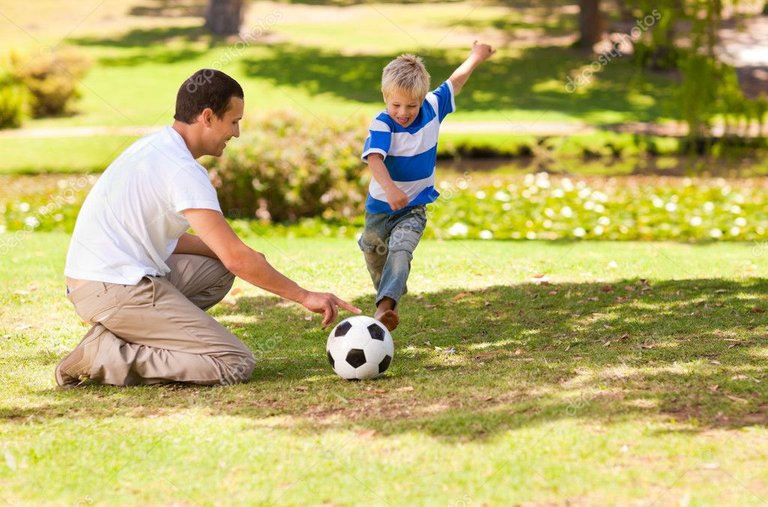Sometimes, some parents have the idea that the time children spend playing is a lost and unimportant time. However, it is important for parents to know that play is probably the most important aspect of a young child's life and what are the benefits of each type of game.
This belief is reflected in the tendency of parents to teach their children a variety of skills, rather than simply playing with their children. In a society that emphasizes tremendously the notes of the school, the success in the economic and the importance of work, it is difficult to abandon the idea that children's play is equivalent to wasting time.
Teachers have a responsibility to ensure that children achieve certain academic goals, parents sometimes become teachers of their children to ensure that they have an adequate development in their studies, as a consequence children from two or three years old are already involved in structured learning to learn to read, write and accumulate knowledge. As a result of all this, the game is often abandoned or relegated to recess time.

The game benefits children in many ways: by giving them opportunities so that they can learn who they are, the scope of what they can do and how they can relate to the world around them. The importance of the game is that it helps the physical, emotional and social development of the child and, above all, the game helps to establish a relationship of affection between the family members, creating positive experiences and feelings that can be used in moments of conflict. Adults can gradually help their children learn during game time.
These four different types of play, along with some toys and recommended activities that favor each type of game, can develop numerous benefits in children's learning. Playful activity through play favors children's learning.
1. Physical play: improves physical skills, contributes positively to the health and muscle development of the child, as well as helping to improve motor control and its coordination between sight and touch.
• Transport toys: rollerblades, bicycle, a car, tricycle.
• Toys for outdoor play: sandpit with shovels and buckets, and swings.
• Active games: the rope, the rubber, the hiding place, pilla-pilla, the handkerchief.
2. The exploratory or manipulative game: this type of game involves solving problems, manipulating, exploring and gaining control over an activity, among other things the child learns that he himself can control the process and the result of all activity. Even the simplest toys allow the child to explore the dimensions of space, manipulate, assemble and disassemble figures to create new shapes and become more sensitive to the color and texture of materials.
• Construction toys:legos, Playmobil.
• Cubes that fit, graduated boxes.
• Paints, paper and scissors, plasticine, clay.
3. Games with norms or rules: preschool children are not yet able to follow them; It is from 6-8 years of age when children are able to interact cooperatively and begin to understand the rules.
• Dominoes
• Table games.
• Card games.
4. The symbolic or imaginative game: involves the use of ideas or symbols, instead of people or objects. Children work with representations of things instead of the things themselves; This type of game starts at 18 months and is present in all healthy children at 3 years. It is an opportunity for the children to think symbolically and gives them a useful defense to resolve things for themselves, helping them to have a better idea of what is real and what is not, allowing them to experience the feelings and emotions of others and be sensitive to the impact that their actions have on the people around them.
• Puppets.
• Costumes.
• Toys related to the house: dolls, trolleys, kitchenette, dishes, plastic food, pans, etc.
• Toy phones and toy money.
• Imaginary activities: set up a store, restaurant, hospital.
For the child, the game is an opportunity to grow and develop in almost all areas. Suppose then that all parents are aware of the importance of the game but, nevertheless, many of them do not see the need to be involved in it. Some of the benefits of the game are unique to the child adult game.

During the game, adults can teach children to:
•Solve problems.
• Encourage vocabulary.
• Learn certain values.
• Show approval to the creative.
• Improve your self-estee.
• Play with other children.
When playing with your children, look and make comments or suggestions that help improve their social skills, learn to make suggestions, express positive feelings, know how to wait, ask permission, praise, know how to wait their turn, share, agree on something , be careful with things, ask for help, be interested in what others do, learn to solve problems or be educated. You can say things like: "How well you asked your brother for help", "That's what good friends do!" How well did you wait for your turn and let your brother come first, even if you wanted him !, or "You are taking great care of this book and that is very good."
As parents and teachers, our goal is to help children become creative and self-confident individuals, who will continue to learn throughout their lives.
